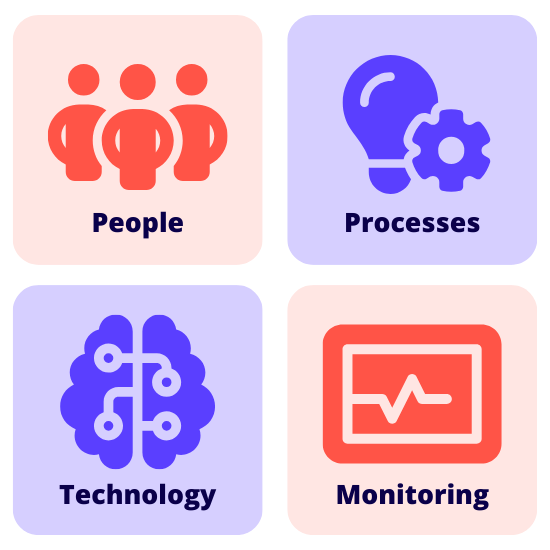Cyber security is all about protecting computer systems, networks, mobile devices, programs, and data from malicious attacks, both external and internal. As a small business owner, it’s not just about installing antivirus software or setting strong passwords. Rather, you need to commit to creating an end-to-end strategy that protects your sensitive data and eliminates a variety of security risks that have arisen due to our increasingly interconnected and digital world.
Why cyber security matters to small businesses
Cyber security is no longer a concern for big corporations alone. Indeed, small businesses are increasingly being targeted because they don’t have the defences of larger enterprises. According to Reckon’s business scam statistics report, scams against small and micro businesses peaked at $17.3 million worth of losses in 2023. Investment scams were the most common, with an average loss of $74k per report. That’s money most small business owners can’t afford.
Cyber attacks come in many shapes and sizes these days, too. Whether it’s stolen financial details, phishing attacks, ransomware, denial of service attacks, or more, the risks are real, and the fallout can be devastating. A single cyber security breach could compromise your customers’ sensitive data or halt your operations for days or weeks at a time.
What is cyber security really about?
At its core, cyber security is about preventing any unauthorised access to your computer systems and data. That includes everything from endpoint security (like laptops and smartphones) to network security, cloud security, and mobile device management. With the right security tools and access controls in place, you can keep malicious software, social engineering scams, and cyber criminals at bay.
Good cyber security also means being able to detect and respond to incidents as fast as possible, which is where threat detection and security orchestration come into play. Implementing systems and processes that allow you to spot vulnerabilities and respond to threats ASAP means you can always protect against unauthorised access.
Top cyber security threats to watch out for

As a small business, you’ll need to be prepared to deal with a wealth of cyber threats:
- Phishing attacks: Emails or messages that trick staff into giving away sensitive information (e.g. credit card details, passwords, customer data).
- Malware: Malicious software that can steal your data and hamstring your systems (e.g. ransomware, spyware, trojans).
- Insider threats: When authorised users misuse their logins to steal sensitive data or give access to outside parties.
- Social engineering: Tactics used by cyber criminals to manipulate your employees into revealing sensitive data or deliberately compromising your systems.
- Denial of service attacks: Overloading your website or systems with incoming traffic to shut down operations.
The latest cyber security threats are becoming more and more sophisticated every day, with the rise of artificial intelligence, zero-day exploits, and malware-as-a-service models posing a serious threat to SMBs.
The 4 foundations of a strong security posture

1. People
Security awareness is one of the most overlooked defences, but it’s still incredibly important. Your team should understand how to spot common cyber threats, use strong passwords, and follow company-wide protocols when dealing with sensitive information.
Training (including at the onboarding stage) on phishing attacks, identifying legitimate software, handling financial details securely, and more can all help to keep human error to a minimum, as it’s still one of the biggest risks in cyber security.
2. Processes
Your business should have procedures in place for how to respond to a cyber security incident, including things like:
- A security strategy for prevention and detection.
- A documented incident-response plan.
- Ongoing reviews (i.e. quarterly or annually) to pick up any new vulnerabilities and apply security patches.
Frameworks like the ACSC’s Essential Eight or the NIST Cybersecurity Framework can guide your small businesses in rolling out the best security measures and set yourself up with a baseline level of protection.
3. Technology
There’s no shortage of security solutions that will be useful to your small business. At a minimum, your tech stack should include:
- Antivirus software for detecting and blocking malicious software.
- Firewalls to control incoming and outgoing traffic.
- Access controls to make sure only authorised users are able to get into to your systems.
- Endpoint security to protect user devices (i.e. staff laptops and smartphones).
- Cloud security if you store data or run platforms in the cloud.
- Encryption tools to protect your most sensitive information in storage and in transit.
Bear in mind that having multiple layers of protection across your network means that if one defence fails, others will be in place to still stop the threat.
4. Monitoring
Cyber security should never be a set-and-forget solution. Ongoing monitoring is the only way to spot emerging threats and keep a strong defence over time. This includes having tools for intrusion-prevention systems, threat-detection platforms, real-time alerts, and automated responses.
If your team doesn’t have in-house cyber security professionals, you can hire security services to stay on top of threats and respond to incidents as they arise.
Best practices for protecting your small business
In order to best protect your business against security threats, you’ll need to take a proactive and layered approach. Here’s how:
- Use strong passwords and set up multi-factor authentication wherever possible.
- Update your software and operating systems to patch security vulnerabilities.
- Back up critical data to a secure offsite location or, more easily, in the cloud.
- Segment your network to limit the reach of a potential cyber attack.
- Train your staff on how to recognise and respond to a variety of cyber threats.
- Carry out risk assessments to spot weaknesses in your current security controls.
- Limit user access to sensitive data and systems to only those who need it.
Cyber security and business continuity
A data breach will affect your technology while at the same time compromising your ability to serve customers and uphold your reputation. That’s why business continuity planning should be a core component of any cyber security strategy.
Your plan should include data recovery procedures, emergency contacts and response protocols, as well as a comprehensive communication plan to alert stakeholders in the event of a breach.
Cyber security might sound technical, but at the end of the day, it’s about protecting what matters most: your data, your business, your staff, and your customers. Taking the right steps to strengthen your defences is time well spent, because in our ever-changing digital economy, staying secure is a must.











































